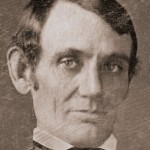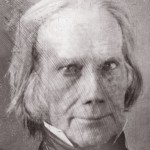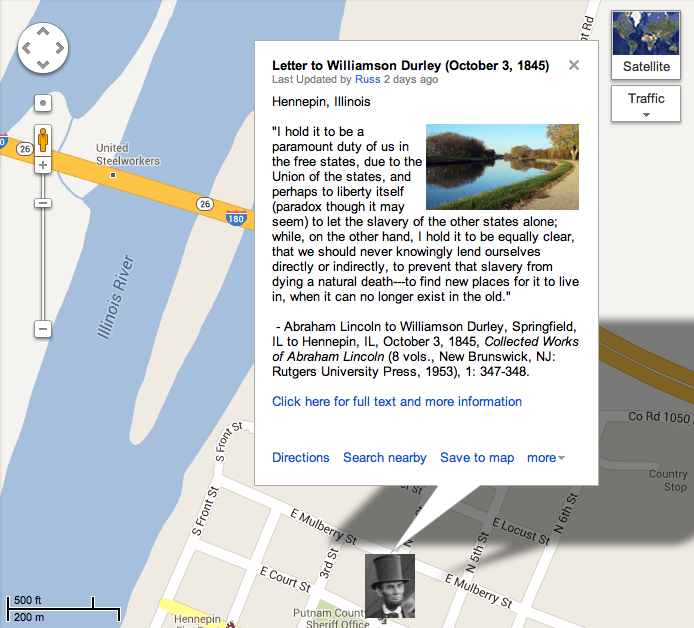Ranking
#23 on the list of 150 Most Teachable Lincoln Documents
Annotated Transcript
“But I will not argue farther….”
Audio Version
On This Date
<ahref=”http://hd.housedivided.dickinson.edu/panel/this_date/1845-10-03″>HD Daily Report, October 3, 1845
Image Gallery
-

-
Lincoln in 1846
-

-
Henry Clay
-

-
Hennepin, IL canal
Custom Map

View in Larger Map
Other Primary Sources
Liberator, “The Following Extract from Certain (Falsely So Called),” November 22, 1844.
How Historians Interpret
“Along with many of his party colleagues, Lincoln blamed the outcome on New York antislavery Whigs who had voted for the Liberty Party candidate, James G. Birney, thus ensuring that Polk would carry the Empire State and, with it, the nation. (In New York, Birney received 15,814 votes, constituting 1.05% of the total; had one third of Birney’s votes gone to Clay, the Kentuckian would have won.) … Lincoln’s analysis, accurate as far as it went, was somewhat misleading. The antislavery Whigs of New York objected to Clay’s wavering on the annexation of Texas, which he had opposed in April; four months later he seemed to recant.”
—Michael Burlingame, Abraham Lincoln: A Life (2 volumes, originally published by Johns Hopkins University Press, 2008) Unedited Manuscript By Chapters, Lincoln Studies Center, Volume 1, Chapter 7 (PDF), pp. 679-980
“Next, he hoped, he could bring the [Whig] party to adopt new principles. As soon as he returned to Washington in December . . . he saw that the central issues facing the new session of Congress were those relating to slavery and its expansion. These were not issues to which he had hitherto given much thought. He had little firsthand knowledge of slavery before he went to Washington . . . Yet he was, he said many times, ‘naturally anti-slavery,’ as his father had been . . . But he did not support any active measures to end slavery because, as the protest said, ‘the Congress of the United States has no power, under the constitution, to interfere with the institution of slavery in the different States.’ The extension of slavery was another matter. Like many of his contemporaries, Lincoln viewed slavery as an institution that would die out if it was confined to the areas where it already existed. Unless slavery could expand, he was convinced, it would become so unprofitable that it would be abandoned . . . Even on this issue he tried not to be doctrinaire. He did not share the fears of abolitionists that the annexation of Texas would lead to the spread, and hence the perpetuation, of slavery.”
—David Herbert Donald, Lincoln (New York: Simon & Schuster, 1995), pp. 133-134
Further Reading
Searchable Text
Springfield, October 3. 1845
Friend Durley:
When I saw you at home, it was agreed that I should write to you and your brother Madison. Until I then saw you, I was not aware of your being what is generally called an abolitionist, or, as you call yourself, a Liberty-man; though I well knew there were many such in your county. I was glad to hear you say that you intend to attempt to bring about, at the next election in Putnam, a union of the whigs proper, and such of the liberty men, as are whigs in principle on all questions save only that of slavery. So far as I can perceive, by such union, neither party need yield any thing, on the point in difference between them. If the whig abolitionists of New York had voted with us last fall, Mr. Clay would now be president, whig principles in the ascendent, and Texas not annexed; whereas by the division, all that either had at stake in the contest, was lost. And, indeed, it was extremely probable, beforehand, that such would be the result. As I always understood, the Liberty-men deprecated the annexation of Texas extremely; and, this being so, why they should refuse to so cast their votes as to prevent it, even to me, seemed wonderful. What was their process of reasoning, I can only judge from what a single one of them told me. It was this: “We are not to do evil that good may come.” This general, proposition is doubtless correct; but did it apply? If by your votes you could have prevented the extention, &c. of slavery, would it not have been good and not evil so to have used your votes, even though it involved the casting of them for a slaveholder? By the fruit the tree is to be known. An evil tree can not bring forth good fruit. If the fruit of electing Mr. Clay would have been to prevent the extension of slavery, could the act of electing have been evil?
But I will not argue farther. I perhaps ought to say that individually I never was much interested in the Texas question. I never could see much good to come of annexation; inasmuch, as they were already a free republican people on our own model; on the other hand, I never could very clearly see how the annexation would augment the evil of slavery. It always seemed to me that slaves would be taken there in about equal numbers, with or without annexation. And if more were taken because of annexation, still there would be just so many the fewer left, where they were taken from. It is possibly true, to some extent, that with annexation, some slaves may be sent to Texas and continued in slavery, that otherwise might have been liberated. To whatever extent this may be true, I think annexation an evil. I hold it to be a paramount duty of us in the free states, due to the Union of the states, and perhaps to liberty itself (paradox though it may seem) to let the slavery of the other states alone; while, on the other hand, I hold it to be equally clear, that we should never knowingly lend ourselves directly or indirectly, to prevent that slavery from dying a natural death—to find new places for it to live in, when it can no longer exist in the old. Of course I am not now considering what would be our duty, in cases of insurrection among the slaves.
To recur to the Texas question, I understand the Liberty men to have viewed annexation as a much greater evil than I ever did; and I, would like to convince you if I could, that they could have prevented it, without violation of principle, if they had chosen.
I intend this letter for you and Madison together; and if you and he or either shall think fit to drop me a line, I shall be pleased.
Yours with respect
A. LINCOLN




